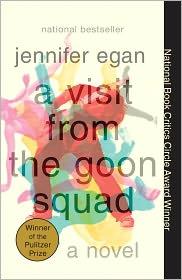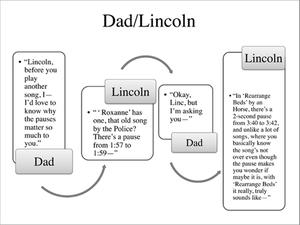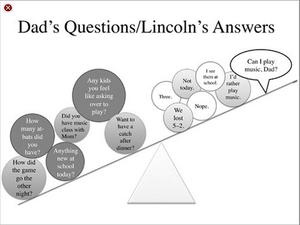I sat down to lunch with Jennifer Egan, author of A Visit from the Goon Squad, in Fort Greene, Brooklyn, exactly one week after she won the 2011 Pulitzer Prize for fiction and HBO announced it would produce a series based on her book. We shared tapas and conversed about everything from Twitter to picky eaters (both of us) to Catholic guilt (hers) and new jobs (mine), but spent most of our time discussing process....
 "I don't hate Twitter at all, but I can't seem to get
in the habit of it. I'm obviously a disaster of a tweeter," Jennifer Egan
lamented.
"I don't hate Twitter at all, but I can't seem to get
in the habit of it. I'm obviously a disaster of a tweeter," Jennifer Egan
lamented.
But Egan just received a Pulitzer for her latest novel, a series of interlocking narratives that features an entire chapter "written" in PowerPoint. Why wouldn't she enjoy the social networking of Twitter? Egan explained, "I'm much more interested in Twitter for fiction. That's really why I joined, because I'm curious about this as a genre, more than as a source of information. Anything that's so volatile and interesting, I just want to be present."
Being present matters a great deal to Egan. "When I was working on Look at Me I felt a little sense of presumption, of overstepping bounds. For example, I write about a guy who's gay in that novel. There was a part of me that thought, wow, I wonder if people will be mad at me. Do I have the right to characterize this experience?"
Egan continued: "But if you're limited to only being able to write about people who are like you, whatever that means, your hands are tied. I feel like writing is, to some degree, about ignoring those voices of critique that tell you you don't have the right to approach certain material." Her instinct to expand the format of fiction into PowerPoint came during the summer of 2008, when the Obama campaign turned around, and some articles on why that happened mentioned a PowerPoint presentation.

Finally, just before the book was finished, Egan purchased the PowerPoint software and went for it. What happened then changed her book. "I'd been trying to write about a character who was sort of corporate, because I guess I thought that kind of person would tell their story in a 'deck.' But that wasn't working, and it didn't start working again until I realized that I hadn't visited my character Sasha in her future life. However, I'd already decided I wouldn't write from anyone's point of view more than once, and I didn't want to break that. Then I realized Sasha's young daughter could write the PowerPoint and it was like, problem solved!"
Unfortunately, by then, it was June, and light revisions on A Visit from the Goon Squad were due in September. "I was taking four to five months to write each chapter," Egan recalled. "I now had two months to do something I'd never done before, and these were also the two months in which I was a judge for the National Book Awards, with 400 books in huge piles around my house and the summer in which my husband's father suddenly died. On top of all that, I didn't know if my editor would welcome this kind of unexpected chapter, But I was driven to do it. The idea of pulling off something new and exciting is so irresistible that it blocks out all of the rest of it. It's like a thrill-seeking thing, almost.
 "Once I finally had the hang of it, I finally
understand why I had wanted to work in PowerPoint so much--it is a sort of
microcosm of the way Goon Squad works
as a whole, which is these vivid moments with big gaps in between, each one
different from all the others. The book is so much about pauses, and somehow
writing this chapter let me figure out those pauses."
"Once I finally had the hang of it, I finally
understand why I had wanted to work in PowerPoint so much--it is a sort of
microcosm of the way Goon Squad works
as a whole, which is these vivid moments with big gaps in between, each one
different from all the others. The book is so much about pauses, and somehow
writing this chapter let me figure out those pauses."
Egan tells me that she thinks that's because the narrator of the chapter, Sasha's daughter, Alison, is the character closest to her creator. "I don't know if it's that I feel my job is to make people uncomfortable, as Alison says, but I do feel like my job is to listen to what people say and watch them. That's what I like to do. That's what I've always liked to do, and I felt different ways at different times about that side of myself. As a teenager I felt like such a loser because I was always watching and listening, never acting, never in the drama. I was always on the sidelines--but now I realize that's exactly where I want to be."
 Egan continued: "It's the most openly sentimental
chapter in the book, which I was able to do only because the coldness of the
form let me go there. If it were written as conventional fiction, it would be
the schmaltziest bore anyone has ever looked at. It only works because of the
cold container. So it ends up being this very emotionally honest chapter, but
structurally, it feels like the heart of the book to me, and I think the book
almost didn't have a heart."
Egan continued: "It's the most openly sentimental
chapter in the book, which I was able to do only because the coldness of the
form let me go there. If it were written as conventional fiction, it would be
the schmaltziest bore anyone has ever looked at. It only works because of the
cold container. So it ends up being this very emotionally honest chapter, but
structurally, it feels like the heart of the book to me, and I think the book
almost didn't have a heart."
So Jennifer Egan can find emotional honesty in a graphics-driven software program--but she still doesn't "get" Twitter or Facebook? She laughed. "I don't really like writing as myself."
Egan explained that she wrote the first chapter of Goon Squad thinking, "It was just a story. I loved the idea of writing about someone taking someone's wallet because I've had my wallet taken so many times, and it's typical of me to leap into the other half of the experience and want to 'see' that. There was actually a specific moment where I was in a hotel bathroom and I looked down and saw a wallet. I suddenly thought: Someone takes the wallet.... Who does it, and why? And that seemed so exciting. I live for that."
Live for what, precisely? "For that moment when I'm not me anymore. I think I crave that in the same way other people might crave community. I want to forget that I'm me. That's what I love about being a journalist. I completely forget that I have a life. I forget that I have a house or children. I just sit there and listen to what is coming at me." --Bethanne Patrick

